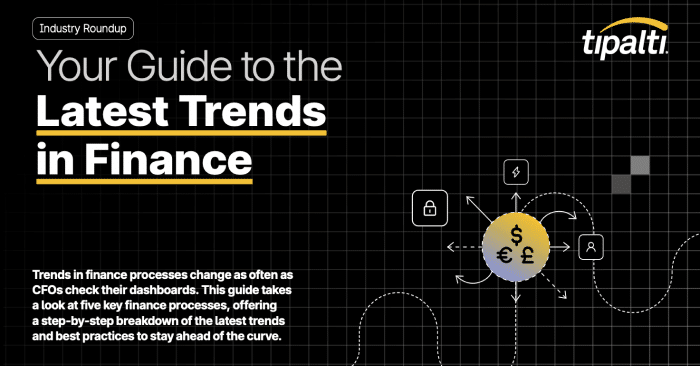
Finance trends shift fast—explore 5 key processes & tips to stay ahead.
Fill out the form to get your free eBook.

Trends in finance processes change as often as CFOs check their dashboards. This guide takes a look at five key finance processes, offering a step-by-step breakdown of the latest trends and best practices to stay ahead of the curve.
Beginning April 2022, all VAT-registered businesses must file Making Tax Digital (MTD) returns. Qualifying businesses will need to maintain their records digitally and make quarterly returns via software that connects directly to HMRC.
While there are workarounds to make spreadsheet submissions via bridging software, companies should move to MTD-approved cloud accounting software if they haven’t done so already.
Given the high adoption rate of MTD-compliant cloud accounting and ERP software, larger companies with complex tax needs are likely already prepared for MTD return filing.
Enterprise-level businesses should make the most of this MTD mandate to further automate and streamline their processes by leveraging the functionality of core platforms and connecting to third-party tools.
What is MTD?
MTD is a government-mandated initiative requiring businesses to digitally keep their tax records in a format that can be reported directly to HMRC’s systems via their API.
It is planned that MTD will make the UK tax system one of the most digitally advanced in the world.
Why Is MTD Happening?
MTD is being introduced to make it easier for individuals and businesses to accurately report their taxes and keep on top of their admin.
The origins of the UK’s tax laws date back to the early 1800s, and it is hoped that this new mandate will enable taxpayers to file more efficiently, as well as reduce the tax gap—defined as the difference between the amount of taxes that should be collected and the amounts actually collected.
HMRC believes that most taxpayers want to report their taxes accurately, but the latest tax gap figures for 2019/20 show that £34.8bn (representing 5.2% of total tax liabilities) wasn’t collected.
The MTD Timeline
VAT
MTD for VAT was introduced in April 2019 for VAT-registered businesses with a taxable turnover above the threshold (currently set at £85,000).
To date, the scheme has been a great success, with HMRC reporting in December 2021 that 1.6 million taxpayers had joined MTD for VAT and more than 11 million returns submitted.
From April 2022, all VAT-registered businesses must file their VAT returns through MTD, even if they registered voluntarily and have turnover below the threshold mentioned above.
Filing and payment dates of MTD for VAT returns are no different from standard VAT returns.
ITSA
MTD for Income Tax and Self-Assessment (ITSA) will be introduced starting April 2024 for sole traders and landlords, with April 2025 set for partnerships.
MTD for ITSA will require businesses to submit quarterly updates to HMRC each year, with a fifth filing at the end of the tax year. This will replace the need to file annual Self-Assessment returns.
Corporation Tax
The exact date of when MTD for corporation tax filings is set to be enforced is unknown, but it has been confirmed that it will not be introduced before 2026.
Which Software Is MTD Compliant?
A complete list of MTD for VAT-compliant software is hosted on the Gov.uk website. MTD-compliant software fulfills requirements by storing and updating records digitally and connecting to HMRC to file returns.
Large corporations are likely to have already implemented MTD for VAT-compliant solutions due to the complex functionality required, meaning they are probably using HMRC-approved accounting or ERP software already.
However, these companies should use this opportunity to assess whether their core accounting software is scalable to fit in with future growth plans and review the range of vendors approved. Adopted solutions may be suitable for today but not flexible enough for future needs.
For example, the functionality required to cope with growth may include consolidating group accounts, converting FX balances, and dealing with high transaction volume.
How Large Companies Can Use MTD To Accelerate Digital Adoption
Alongside reviewing whether accounting and ERP packages are future-proof, large companies should use the introduction of MTD for VAT to consider whether they are making the most of automation features to make the running of the finance function as seamless and streamlined as possible.
This will make it easier to comply with MTD and free up the time of finance teams to focus on value-added activities, such as forecasting and scenario planning.
CFOs should aim to minimize manual entry, increase real-time data visibility, and reduce the risk of human error.
Quick wins from core packages include setting up rules around bookkeeping to auto categorize transactions based on keywords and reconciling invoices to bank lines with keyword and value matching.
Integrating data capture tools for invoices and the accounts payable automation will further remove pain points and make MTD compliance easier by speeding up transaction processing.
The right solution should allow for all workflows to be housed on a single platform, rather than needing to download, upload, and manipulate data across multiple systems. Incorporating a direct third-party integration for managing the end-to-end lifecycle of accounts payable means invoices can be approved, posted, paid, and reconciled quickly and easily. This will enable organizations to drastically reduce the time needed to complete payables tasks and scale functions without needing to add extra headcount.
Conclusion
Enterprise-level companies are likely already using MTD for VAT-approved software, with an established API connection to HMRC, meaning they don’t need to devote too many resources to comply with the new legislation, and complete filing and payments according to existing VAT deadlines.
However, reviewing whether existing software is scalable, and maximizing automation of finance processes will set them up for further growth.
